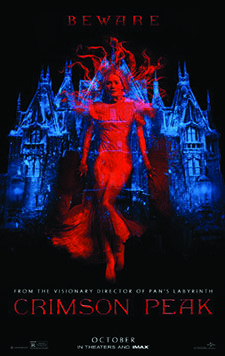With “Crimson Peak” (Universal), director and co-writer Guillermo del Toro aims for an old-fashioned haunted house entertainment in the Vincent Price vein.
What he winds up delivering instead is a hothouse hybrid of historically naive costume drama, queasy decadence and visceral violence.
His luxurious, though overripe, ghost story — played out against a series of undeniably handsome turn-of-the-20th-century backgrounds — centers on Buffalo, New York, heiress and aspiring novelist Edith Cushing (Mia Wasikowska).
A proto-feminist bluestocking, Edith displays little interest in any affairs of the heart that might transpire beyond the confines of the printed page. Until, that is, titled but impoverished British mine owner Sir Thomas Sharpe (Tom Hiddleston) arrives in town.
Accompanied by his spooky sister, Lucille (Jessica Chastain), Sir Thomas has come to the new world in search of fresh capital to revive the family business. His prime target in the Queen City is none other than Edith’s loving father, Carter (Jim Beaver), a thriving architect and respected civic leader.
Self-made Carter, however, has no time for the soft-living baronet — either as a business partner or as a potential son-in-law. Could that be the reason Carter quickly meets his doom in what the audience knows to be a spectacularly brutal murder but which the characters around him are content to let pass for a somewhat mysterious accident? Well, in a word, yes.
With dad out of the way, Edith and Sir Thomas promptly wed and, with the ever sinister Lucille still in tow, depart for the grand but dilapidated family seat in the English countryside. There, of course, further eerie doings are bound to be added to the occasional encounters we’ve already witnessed between 10-year-old Edith and her recently deceased, mightily worked up mother (Doug Jones in special-effects drag).
For all of its visual richness, “Crimson Peak” is fatally flawed on a number of levels. Take, for instance, the chronological ignorance — or indifference — that leads the screenwriters (Matthew Robbins collaborated with del Toro on the script) to portray the waltz as something new and daring to the people of 1901. Napoleon might well have found the waltz novel — Teddy Roosevelt, not so much.
That’s just one of the factors that cause the movie — with its relentlessly off-key human interaction — to come across as more Harlequin Romance than Bronte sisters classic.
Of far greater concern than any literary slide, however, is the decline that sees the gruesome details of Carter’s demise repeated and multiplied. As the action intensifies toward its lurid conclusion, thematic elements also go south, plumbing the depths of repellent depravity.
The film contains excessive gory violence, semi-graphic scenes of perverted sexual activity and marital lovemaking, brief rear nudity, a pornographic image and at least one rough term. (O, R).

